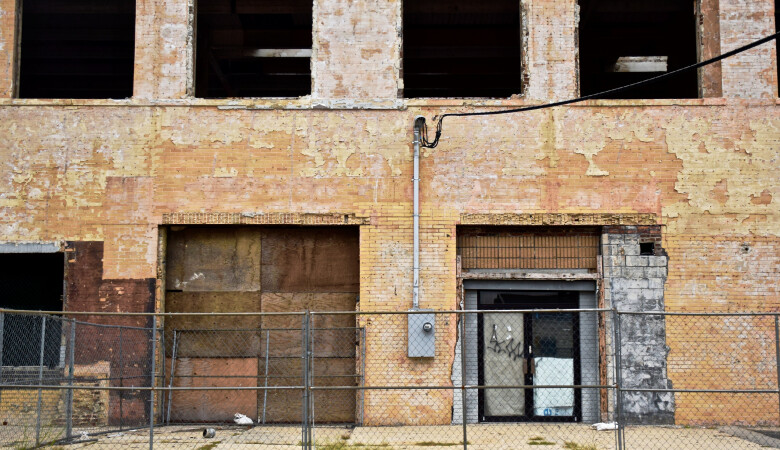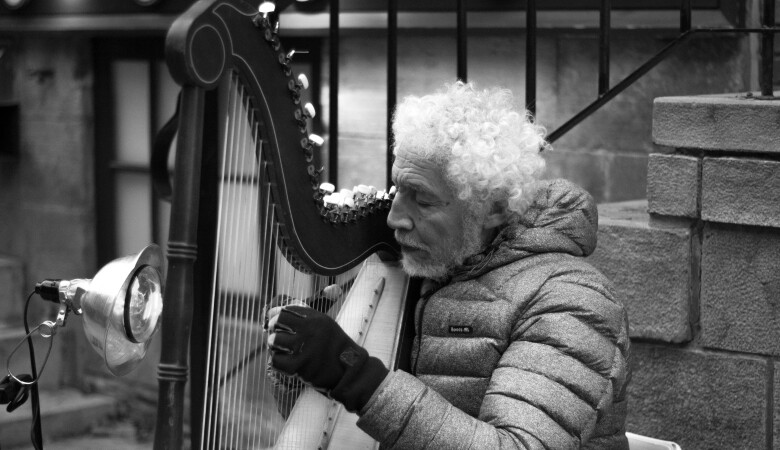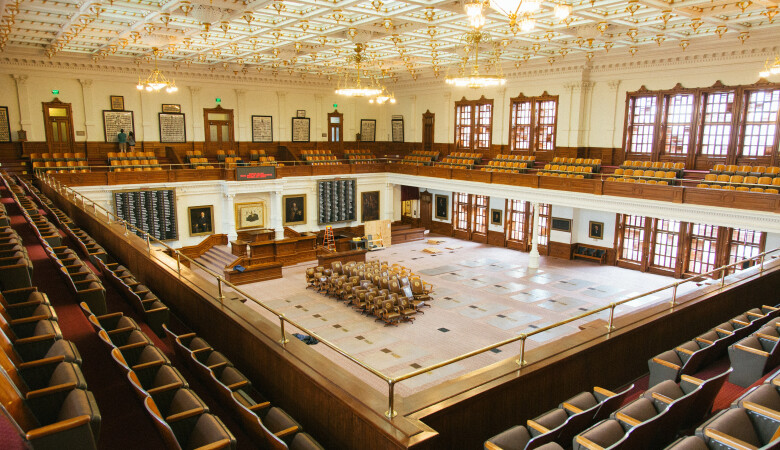The Victorious Advance of Christ's Delightful Gentleness (Matthew Sermon 51 of 151)
April 06, 2003 | Andy Davis
Matthew 12:15-21
Exaltation of Christ
Introduction
Take your Bibles and look with me at Matthew 12:15-21. This is a very propitious time, a good time for us to be looking at this text as we see the events unfolding in Iraq. We see the descent of yet another human kingdom back into the dust from which it came as we watched Saddam Hussein's shabby reign come to an end, a reign of pillage, a reign of murder, a reign of distress and strife. That human kingdom goes back into the dust as all the others have before it, one after the other. The 20th century has been a time for these kinds of kingdoms to rise and fall right before our eyes. We've seen them one after the other, and we've seen a specific kind of leader, a specific kind of kingdom builder, namely the street level, rabble-rouser, the kind of man who could stand up in front of people who are already predisposed to be angry, to be revolutionary, to be angry and upset, and to organize them into a force for revolution— the street level rabble-rousers like Benito Mussolini who was able to take his black-shirted fascists on a march to Rome and led Italy into fascism. Or Lenin who had the ability to stand and harangue a crowd and whip them into a frenzy, and lead them into the October revolution, over throwing the old czarist system.
Certainly, we know that Hitler had this ability to harangue people and take the frustrations and the economic deprivations of Germany, post World War 1, and whip it into like a frothy sea, a title wave of passion and anger, and military strength. Mao had the same ability to mobilize the frustrated peasants, organize them, and move out for revolution. He was able to sense the times, to tap into the force of the people and their anger, and with a fist and with the harangue move them to action. And the Lord Jesus Christ could have done that, couldn't He? He had the power and the ability to sway and to move people. There certainly were forces for revolution in Israel in His time. The Zealots, for example, would have been willing to lay down their lives, to suffer and die, to see Rome evicted from the Promised Land, but this is not how Christ chose to build His kingdom, and we see that in the text today. Seven centuries before Christ, Isaiah foretold the kind of king, that our Messiah, our Savior would be. He would be a servant. He would be the servant of the Lord.
Kingdom Building: A Different Way - Withdrawal & Servanthood
Isaiah gives us a beautiful prediction quoted by Matthew of a peace loving, gentle, humble, servant ruler who would build His kingdom an entirely different way. Unlike the others, they would not rise, have their moment in the sun, and then sink back into the dust. Not at all, but this kingdom only gets stronger and more powerful until in the end, it will consume the whole earth. Isaiah said and quoted by Matthew, "Here is my servant whom I have chosen, speaking of Christ, the one I love and whom is my delight. I will put my spirit on Him and He will proclaim justice to the nations. He will not quarrel or cry out. No one will hear His voice in the streets, a bruised reed, He will not break. And a smoldering wick, He will not snuff out until He leads justice to victory. In His name, the nations will put their hope." That's speaking of a kingdom being built, but in a way no one had ever seen before since, the kingdom of Jesus Christ. The basic idea here is that Jesus Christ has enemies who want to oppose Him. They want to kill Him, to crush Him.
In the context of that, instead of confronting Him like any of these dictators would, He withdraws. He pulls back. Who follows him but the weak, the sick, the lowly, ones that no one would want. He ministers to them. He heals them. He preaches the gospel to them. And in that way, He gains a kingdom. He's been doing it for twenty one centuries, building a kingdom little by little in a way that no one would ever have done before Him. It is a kingdom of the gentle, humble, servant leader, who takes bruised reeds and smoldering wicks like us, and builds out of us, a mighty kingdom. This is our Lord and Savior Jesus Christ. The context of this that we're looking at, starts out in the NIV, "Aware of this, Jesus withdrew."
In verse 14, Jesus's enemies are plotting to kill Him because He's been humble. He's been gentle. He's reaching out to His disciples who are hungry and enabling them to eat grain on the Sabbath, and even worse, He's healing on the Sabbath, taking a man with a withered hand and restoring it just like new. Because of Jesus' humility, because of His gentleness and love, and His tenderness, and the fact that He wouldn't follow their rules, they found Him dangerous. In Verse 14, they plot to kill Him. The overall context here in Matthew 11, and 12 is of human responses to Christ's kingdom. That's where we're at in Matthew's Gospel. Overall, the big picture of Matthew's gospel, as you know, is the building of the kingdom of heaven. It's the advance of the kingdom of heaven. It's the coming king, Jesus Christ, the one who is the son of Abraham, the Son of David. He is the King of the Kingdom of Israel. The genealogy establishes Him as the descendant of both David and Abraham, the one who came to fulfill those promises.
We see unfolded in the first ten chapters, the evidence that Jesus is a fit and worthy King of the Kingdom of Heaven. He is the Son of God. He is the son of man. He's the king. In chapters 11 and 12, we start to get the responses back. How is He being heard? Are people believing? Are they responding? It starts out amazingly with John the Baptist, who can't quite get it, who can't quite understand why Jesus is not ruling the way that he expected, and he said, "Are you the one who has to come or should we expect someone else?" Jesus says, "Watch this," and does some miracles. He heals the weak, the sick, the blind, the lame, and says, "Go back to John and report what you've seen and heard." John hears, and we believe he was strengthened in his faith and believed and trusted that Christ was right on schedule and the kingdom was fine.
Then Jesus deals with the problem of Chorazin, Bethsaida and Capernaum, Jewish cities that rejected Him. They weren't fomenting against Him. They weren't seeking to kill Him. They were just bored by Him. They came and saw the miracles, they were interested but then they went back to their lives, they were indifferent, they did not believe. Jesus deals with them, and says, "Woe to them. " It's a very serious matter, to reject Christ. Then He goes right from there to an extended discussion on the sovereignty of the kingdom. "I praise you Father, Lord of heaven and earth," He says. "All of these things being done according to your will, your power, your plan." Then He gives a gentle invitation. “Come to me all you who are weary and burdened and I will give you rest." This is our King and this is the way it's working. Human beings rejecting the king, but He continues on in His gentle manner, building the kingdom through preaching and through healing, and through the work that He was doing. The Pharisees couldn't handle it. There was trouble over the Sabbath, so the religionists organize, they attack. In Verse 14, “[the]Pharisees went out and plotted how they might kill Jesus." In the end, their plot will be successful, in one sense. They will kill Him, He will die. But His kingdom will go on forever. His kingdom is built specifically on the bloody shed at the end of their plot. This is the building of the king of the Kingdom of Heaven, and His kingdom.
We have in verse 15, Jesus' response to His enemies. He is aware of this, aware that they were rejecting, aware that they are plotting to take His life. You might say, "I wonder what His source of information is?" Every mighty king's got a fifth column, maybe some spies that are letting Him know, but Jesus knew their thoughts, He knew their hearts, He knew what they were doing. At one point, He confronts them in John's Gospel and said, "You're trying to kill me." He goes right to it and says, "You're trying... " They denied it at that point, but it was true, they were. What does Jesus do? Aware of this plot, He withdraws. He pulls back from that place. This is typical of the humble servant-hood of Jesus Christ. He is living only to do the will of His Father. This is His purpose. His purpose is to do his Father's will. He is not seeking glory for Himself. He says it directly in John 8:50, "I am not seeking glory for myself." He's not seeking adulation, human praise. He's not seeking this kind of a human kingdom.
Most empire builders, most kingdom builders when they're confronted with some opposition, perhaps even from within their own numbers, go on the attack, the preemptive strike. The purge for example. If they find out that there's some factions within the group, they're going to eliminate them, they're going to cut off heads, they're going to purge before they can get killed in return; they're going to be aggressive. Jesus doesn't do this, instead He withdraws, He pulls back. He's so different. Every time He's faced with this kind of strong opposition, He withdraws. In Matthew 4:12, "When Jesus heard that John had been taken into custody, He withdrew into Galilei." Matthew 14:13, "When Jesus heard what had happened, He withdrew by boat privately to a solitary place." John 8:59, "Of this, they picked up stones to stone Him, but Jesus hid Himself slipping away from the temple grounds.” John 12:36, "When Jesus had finished speaking, He left and hid himself from them." This is a repeated pattern. Pulling back, sliding away, even hiding Himself.
Christ also withdrew not just in the face of opposition, but in the face of surging human adulation. After feeding a group of 5,000 people who wanted to take Him by force and make Him king. He does the same thing, John 6:15, "Jesus knowing that they intended to come and make Him king by force, withdrew again to a mountain by Himself." Again, the same word “withdrew”. This is the way He works. Evidence of this withdrawing is right in our text. We see consistently when Jesus does these miracles He warns people,.”Don't tell anyone, be quiet about it." Look at Verse 15 and 16, "Many people followed Him, and He healed all their sick warning them not to tell who He was." It's very interesting, isn't it? It's all part of that same approach, pulling back. Christ did not desire to build some kind of a populist Jewish movement, an anti-Roman zealot thing in which there are all these people clamoring for him to become king, to be crowned. This isn't what He's doing. They didn't understand Him. They didn't understand His Kingdom. He's pulling back away from them.
Now let's clear away some misunderstandings about this withdraw. Christ did not withdraw out of fear. He wasn't afraid of anybody. On the contrary, when the time came for His arrest in John 18, He goes out the garden through the gate and confronts 600 men with weapons who are there to arrest Him. He stands right there in front of them and says, He says, "I am." "Who are you seeking?" "Jesus of Nazareth.” "I am." He confronts... He's not afraid of anything. Secondly, Christ did not withdraw out of weakness or lack of military strength. You know what happened when He said “I am” that night? They all fell down in front of Him. Just the word of God, all He has to do is say, "I am,” and down they go. It would have been a very one-sided battle if He didn't want to die that night. It would have been over quickly. Furthermore, if He wanted to, He could have called on His father, and He would at once put at His disposal more than twelve legions of angels. Julius Caesar conquered Europe with eleven legions of men. Jesus said, "I've got twelve legions of angels." What's the difference? One angel comes down on the morning of Jesus' resurrection, moves the stone and just because of His appearance, the Roman soldiers fall away like dead men just because of how he looked. Three angels in Revelation, poured out their bowls and a third of the world died, that's three angels.
Twelve legions would do the job. So he does not withdraw because of lack of military strength or power and he does not withdraw because he doesn't want to be king. He does want to be king. As a matter of fact, he is king. You remember what Pontius Pilate said to him, "You are a King then." Jesus said, "You are right in saying that I am a king. It is for this reason I entered the world. This is why I'm here, to build a Kingdom. Everyone on the side of truth listens to me. That's how I've built my kingdom by a proclamation of the truth. People listen. That's how I've built my kingdom. Not what you're thinking Pilate. Not the Caesar way."
He did not withdraw because he didn't want to be King. Jesus withdrew because his kingdom would not be built that way. It's going to be built another way. He withdrew because he was not willing to shed his enemies’ blood. He didn't want to slaughter them, and that's what it would have taken. Rather he wanted his own blood to be shed. Not when they thought, but when he's chose at the right time in the fullness of time, at the Passover, after the third year of ministry, that's when it would happen, not before because his time hadn't come yet. He withdraws because he doesn't want to slaughter his enemies. He wants to be the sacrifice, the one slaughtered. Secondly, he withdraws because he wants to demonstrate that his kingdom will be built through gentle, humble, servant ministry to the weakest lowliest off-scourings of society that nobody wants. In his withdrawal, he builds his kingdom that way. The combination of humble servant-hood under death, an irresistible gentleness, has built the greatest empire in the world and it's only going to get bigger and stronger. That's why he withdraws.
Isaiah gives us an astonishing portrait of our king. He shows us with an incredible prophecy here, seven centuries before Christ, what our Messiah is going to be looking like. "Here is my servant whom I have chosen, the one I love and whom I delight. I will put my Spirit on him, and he will proclaim justice to the nations. He will not quarrel or cry out, no one will hear his voice in the streets. A bruised reed, he will not break, and a smoldering wick, he will not snuff out till he leads justice to victory. In his name the nations will put their hope." Isaiah's visions are the foundation, a very strong foundation of Matthew's proof that Christ is who he claims to be. Matthew is constantly quoting Isaiah, verse 17. "this was to fulfill what was spoken through the prophet." Six times Matthew quotes Isaiah, showing how Christ fulfills Isaiah's prophecy Christ's entire ministry was prophesied seven centuries ahead of time.This gives us great evidence that Christ is who he claimed to be.
Kingdom Building: God’s Calling to Christ
Three bullet points: first Christ calling by God, secondly, Christ conduct of that calling, and third Christ's consummation of that calling. First Christ calling by God: Verse 18, "Behold my servant whom I have chosen, the one I love and whom I delight." Are any of you reading the NIV? Do you notice the “behold” is missing? That frustrates me, because it's in the Greek. Let's put it back. "Behold." "Everybody look, sit up and take notice," says the father. "Look at my son. Behold my servant. Look at him." Take a minute if you would and go back to Isaiah Chapter 52:13 where it says, "See my servant." Well, they did a little better there. They at least put the "see" in there, but I still like “behold” better. It makes you sit up and take notice. "Behold my servant. Behold my servant will act wisely. He'll be raised and lifted up and highly exalted. Just as there are many who are appalled at him, his appearance was so disfigured beyond that of any man and his form marred beyond human likeness. In that way, he will sprinkle many nations, and kings will shut their mouths because of him. For what they were not told, they will see, and what they have not heard, they will understand."
This is the message of the cross, isn't it, of a disfigured grotesque man, who in that way, sprinkles nations with his blood and atones for their sin. A message goes out. Kings will hear about him, and they will believe. In Isaiah 53:1, "Lord, who has believed our message?” The Jews would reject." Paul picks up on this. They would not believe, they would not accept. Why? They could not factor in the suffering servant image here. “Who is this, this suffering servant? We don't understand. How can we have a Messiah that would shed His blood, whose appearance is grotesque and disfigured beyond that of any human likeness?” Who could this be? They took this passage and set it off to the side, or they thought perhaps it was Israel or something, they didn't know what to do with it.
Listen again to what it says, [Isiah 53: 1-6]“Who has believed our message and to whom has the arm of the Lord been revealed. He grew up before Him like a tender shoot and like a root out of dry ground. He had no beauty or majesty to attract us to him, nothing in His appearance that we should desire Him. He was despised and rejected by men. A man of sorrows, and familiar with suffering, like one from whom men hide their faces. He was despised, and we esteemed Him not. Surely he took up our infirmities and carried our sorrows. Yet, we considered him stricken by God, smitten by him and afflicted, but He was pierced for our transgressions. He was crushed for our iniquities. The punishment that brought us peace was upon Him and by His wounds, we are healed. We all like sheep have gone astray. Each of us has turned to his own way. And the Lord has laid on Him the iniquity of us all." This is the suffering servant. They can't figure it out. Who could this be?
Look at Isaiah 53:10, "Yet it was the Lord's will to crush him and cause him to suffer. And though the Lord makes his life a guilt offering, he will see his offspring and prolong his days, and the will of the Lord will prosper in his hand. After the suffering of his soul he will see the light of life and be satisfied, and by his knowledge, my righteous servant will justify many, and He will bear their iniquities." This is the triumph of the suffering servant. I believe it's predicting His resurrection. After He suffers, He rejoices, He sees the bounty. Go back now to Matthew. Do you see now the potency of this prediction? In verse 18, "Behold my Servant." This is the servant of the Lord. “Jews, you can't figure Him out. But here He is; He's humble, He's a servant, He's broken, He's going to die on the cross.” In verse 14, they're going to plot to kill Him. Verses 15-18, He's going to yield to it. He's the servant; He's going to die because He's the suffering servant of the Lord.
Christ's calling by God is that He is the suffering servant. "He came," it says in Matthew 20 verse 28, "Not to be served but to serve and to give His life as a ransom for many." John 6, "I have come down from heaven not to do my own will but to do the will of Him who sent me. And this is the will of Him who sent me, that I shall lose none of all that He has given me, but raise them up at the last day." This is the servant of the Lord, He does the Father's will. Philippians 2:5-8, "Your attitude should be the same as that of Christ Jesus, who, being in very nature God did not consider it equality with God something to be grasped, but made Himself nothing, taking the very nature of a servant, being made in human likeness. And being found in appearance as a man, He humbled Himself even to death, death on a cross. Therefore God exalted Him to the highest place." That's the servant of the Lord, the suffering servant, and that's His calling. He's called to be a servant.
It also says that He's chosen, "Here is My servant, whom I have chosen." Christ was specifically chosen by God for this role. He is the elect. He is the chosen one of God. The Greek word here for “chosen” is a little unusual, it means the irrevocable choosing of one out, usually connected with adoption. I'm not saying that Christ was adopted by the Father, but there is a strong choosing here done by the Father for this role. God chose Christ before the foundation of the world that He should suffer and die.
In I Peter 1:18-20, "For you know that it was not with perishable things such as silver or gold that you were redeemed from the empty way of life handed down to you by your forefathers. But with the precious blood of Christ, a lamb without blemish or defect, He was chosen before the creation of the world, but has now been revealed for your sake." And so before God even said, "Let there be light", Christ was chosen for this role. Before the foundation of the world, He was the chosen of God, chosen to be the living stone, a foundation for the spiritual house that He's going to build. 1 Peter 2 he says, "As you come to Him, the living stone, rejected by men but chosen by God and precious to Him, you also being built upon Him." He's the chosen one, chosen for this role.
Thirdly, He's beloved and delightful to God. "Here is my servant whom I have chosen, the one I love in whom I delight." He delights in His Son. KJV puts it this way, "Behold my servant whom I have chosen, my beloved in whom my soul is well pleased." The Father speaking of the Son. What a beautiful meditation it is to think of the strength of the love the Father has for His own Son. It burns brighter than a trillion suns. He loves His Son, and so He's willing at His baptism to say, "Behold my Son whom I love. In Him I am well pleased." He's going to say it again at the Mount of Transfiguration when Peter is running off the mouth; "Peter, be quiet." A bright cloud envelops them, and a voice comes from the cloud and says, "This is my Son whom I love. With Him I am well pleased, listen to Him, as opposed to talking like you're doing right now. Listen to Him, this is my Son." So the delight of the Father for the Son; John 3:35, "The Father loves the Son and has placed everything in His hands." John 5:20, "The Father loves the Son and shows Him all He does." John 10:17, "The reason the Father loves me is that I laid down my life for the sheep." The Father loves the Son because the Son is a perfect representation of the Father. The Father loves the Son because the Son was his co-laborer in creating the universe; they worked together at it. Through the Son, God made all things. The Father loves the Son because the Son is zealous for the Father's glory and would rather die than disobey His Father. The Father loves the Son because He's willing to lay down His life for you and me. He says, "This is My beloved one, my soul is well pleased with Him." Jonathan Edwards put it this way, "The infinite happiness of the Father consists in the enjoyment of the Son." Now you say, "How does that relate to me? Please make it relevant." Now let me tell you something, you don't get saved any other way, that's how you get saved. You are seen in Christ, and so when the Father is lavishing love on the Son and you're in Him, you receive that. We are chosen in the beloved, chosen in Christ, we are loved in Him. Ephesians 1, "In love He predestined us to be adopted as his sons through Jesus Christ in accordance with His pleasure and will, to the praise of His glory, His grace which He has freely given us in the one He loves." KJV had it this way, "We are accepted in the beloved." Because the Father loves the Son, we get to go to heaven. We are chosen in Christ. "Behold my servant whom I have chosen, the one I love, in whom I delight."
How Christ Builds His Kingdom
Number one, Christ's calling by God. Number two, how does He conduct that calling? In Matthew 12:18 He says, "I will put my Spirit on Him, and He will proclaim justice to the nations." Positively, we have here a Spirit-empowered, enduring proclamation of justice to the nations; that's how He's going to carry out His calling. The Spirit is going to be on Him, and He will proclaim. Christ was, first of all, saturated with the Holy Spirit. He was conceived by the Spirit in his mother's womb. The Spirit came upon Him at His baptism, landed upon him. He was led by the Spirit into the desert to be tempted by the devil, led out of the desert by the Spirit to preach and proclaim. He stands up to preach for the first time in Nazareth, what does he do but find a place in Isaiah in which he says, "The spirit of the Lord is upon me." What is he saying? "I'm the Messiah." That's what he's saying. "The Spirit of the Lord has anointed me." He was empowered by the spirit to do miraculous signs and wonders, filled by the spirit to proclaim the kingdom to Israel, led by the spirit to the cross to suffer and die, raised by the Spirit from the dead on the third day.
“I [God]will put my Spirit on Him and He's going to proclaim justice to the nations.” If you would have been a first century Jew, you would have been stunningly disappointing. “I don't want the Gentiles to have justice proclaimed to them, I want them to have justice at the end of a two-edged sword. That's the kind of justice, I want. Not a proclamation of justice, a conquest of Jewish justice. That's what I'm looking for.” No, he's going to proclaim justice. What does that mean? Two senses; it has to do with the Gospel. Justice and righteousness, the same thing, he's going to proclaim, to Jew and Gentile alike, that there is a righteousness, a justice available by faith to those who simply repent, and trust Him. He will proclaim the gospel of justice that in his death on the cross God's justice has been satisfied, and he can justify us through faith. That's one sense of the justice. Secondly, he's going to proclaim the justice of God in vengeance and wrath on all who do not obey the gospel. A two-edged proclamation will go forth, just not yet on the second one. This is the day of the year of the Lord's favor, this is the time of proclamation and grace, and mercy. He will proclaim justice to the nations, to the ends of the earth.
He's going to proclaim justice to the islands it literally says in Isaiah. He's going to go right to the end. How is he going to do that? He sent His Spirit and He says, "You will receive power when the Holy Spirit comes on you and you will be my witnesses in Jerusalem, Judea, Samaria, to the ends of the Earth." He goes on by the Spirit proclaiming justice to the nations through us. So it goes, patient endurance to the end. Isaiah 42:4 says literally, "He will not falter or be discouraged until he succeeds." He is not going to give up, he's relentless, he never gets discouraged. There’s never a bad day in the Kingdom of Heaven. He doesn't falter, he doesn't get discouraged, he just builds his kingdom day after day after day. It doesn't matter what you read in the newspaper this morning, Christ is building his kingdom, and he will not falter nor be discouraged. He's going to keep going, and he's going to win. That's positively a Spirit-filled patient, enduring proclamation of justice to the nations to the end. Negatively, however, he will not do some things; he will not be a harsh, street level, rabble rouser with his fist in the air whipping people up into a revolutionary frenzy. Verse 19, "He will not quarrel or cry out, no one will hear His voice in the streets." This is interesting, in one sense, Jesus does proclaim in the streets, doesn't he? He raises up his voice. John 7:37, "On the last and greatest day of the feast, Jesus stood and said in a loud voice, "If anyone is thirsty, let him come to me and drink." Or he'll stand in front of Lazarus' tomb after the stone has been removed and he'll call out in a loud voice, "Lazarus come forth." And Lazarus will come. Or he'll get up on the cross, and in a loud voice, he will cry out "Eloi, Eloi Lama Sabachthani," which means, "My God, my God, why have you forsaken me?" He'll cry that out in a loud voice. Through His suffering on the cross under the wrath of God He can invite anyone who's thirsty to come and drink, and he can stand in front of a tomb, and call you and me out to everlasting life. He's not going to build some shabby, earthly, dusty kingdom that's going to sink back down into the dust. He's not going to stand and call in the streets in that way.
He's also not going to use and abuse people the way those revolutionary dictators do. "A bruised reed, He will not break, and a smoldering wick, He will not snuff out." These people are worthless to a revolutionary dictator. They can't do anything with them. You can't build a strong structure with a bruised reed. Revolutionary dictators need angry powerful, strong young people who are willing to risk anything to overthrow the existing regime, not bruised reeds and smoldering wicks. Christ is different, isn't he? He's going to take weak people, sick people, lame people. He's going to take lepers, who no one wants to touch or be near. He's going to take blind people. He's going to take demon possessed people who are an embarrassment to the entire culture and he's going to work with them. He's going to take prostitutes, tax collectors, sinners of all kinds and he's going to build a kingdom out of them. He's not going to do those things; raising His voice in the streets and crushing and dispensing people when he's through with them, not at all.
Thirdly, Christ's consummation of that calling. Let me put it to you very simply. He's going to win! He's going to be victorious! He wins in the end. "A bruised reed He will not break, a smoldering wick He will not snuff out, until He leads justice to victory." He's a leader and He's going to win. He's going to be victorious. In the end He will succeed, and in His name the nations will put their hope. He will be a king, and all over the world, even to the distant most islands, even there there will be people trusting in His Name and following His law. Even there His kingdom will be. He will win. For everyone who calls on the name of the Lord will be saved.
Application
What application can we take from this? First of all, let the servant of the Lord serve you. The Son of Man did not come to be served, but to serve. He doesn't need anything from you. He doesn't need you to build his kingdom. He'll build it, it's going to succeed. Let him serve you. Let Him be your sin bearer first and foremost. Let Him be your atoning sacrifice. Let Him cleanse you and prepare you for heaven, let him clean you up. Secondly, let Him get down on his knees and wash your dirty feet every day. Let Him atone for your sins, let Him cleanse you and sanctify you daily. Let him serve you. Don't think that you can bring to Him some sacrifice to help Him in His kingdom endeavor. "Lord, I've heard you're building a kingdom and I like to chip in a little. I'd like to help see what I can do." He doesn't need that. Let Him serve you. That's humbling, isn't it, to let Christ serve you? "I want to think I had some hand in it." No, no. Let Him serve you. Let Him cleanse you. Let Him die for you as your Savior and then let Him cleanse you day after day.
Secondly, how does this kingdom grow? Zechariah 4:6. "Not by power, nor by might but by my Spirit," says the Lord. That's how the kingdom's going to grow. You know what that means? By the Spirit. By the Spirit's wisdom and by the Spirit's power. What do I mean by Spirit's wisdom? He is unpredictable, actually, His ways are not our ways, His thoughts are not our thoughts. What that means is there are some times that he's going to do things that you would not think he would do. His wisdom is unpredictable. He's not building it by our gifts, our talents, our skills, our efforts, our money, but by Him, by His power. That's how the kingdom's going to grow. Therefore we need to have full confidence that the Spirit's going to lead this church, and the world-wide kingdom of Christ to its final end. Just follow the Spirit. Keep in step with the Spirit. Do what He tells us to do. Don't be a worldly empire builder, not in your business, not in your family. Follow and imitate Christ. He was a humble servant leader. Be that way.
Thirdly, don't be intimidated or impressed by earthly, dusty kingdoms. Don't be intimidated or impressed by people like Saddam Hussein who rise for a while and have their moment in glory and then they fall back down. That is not the story of the world. It may seem like it is. Against the backdrop of it Christ advances his kingdom. But that's not the story. So don't be intimidated. Where is Leninist Russia now? Where is Hitler's 1000-year Reich? It lasted 13 years. It's gone. Where is Christ's kingdom? Stronger than ever before.
Now let me say this one delicately, and hear me carefully, limit your patriotism. There is a difference between America and the Kingdom of Heaven. Many American leaders are Christians. They love the Lord. We praise God for them, we pray for them, but there is a difference between America and the Kingdom of Heaven. They advance by different means. In many cases they have a different agenda. Our first loyalty is as it says in Philippians 3, "Our citizenship is not on earth, it's in heaven." I pray for our President, I pray for our troops. I own American flags I display them, I have patriotism. I honor those that have sacrificed their lives that we might have freedom, but realize there's a distinction between America and the Kingdom of Heaven. Christ's kingdom lasts forever, America does not. Let's keep that in mind as we continue to pray for our President and the troops. Finally pray, give, and go, so that those islands will hear the gospel because Christ intends to establish his kingdom even there.






























